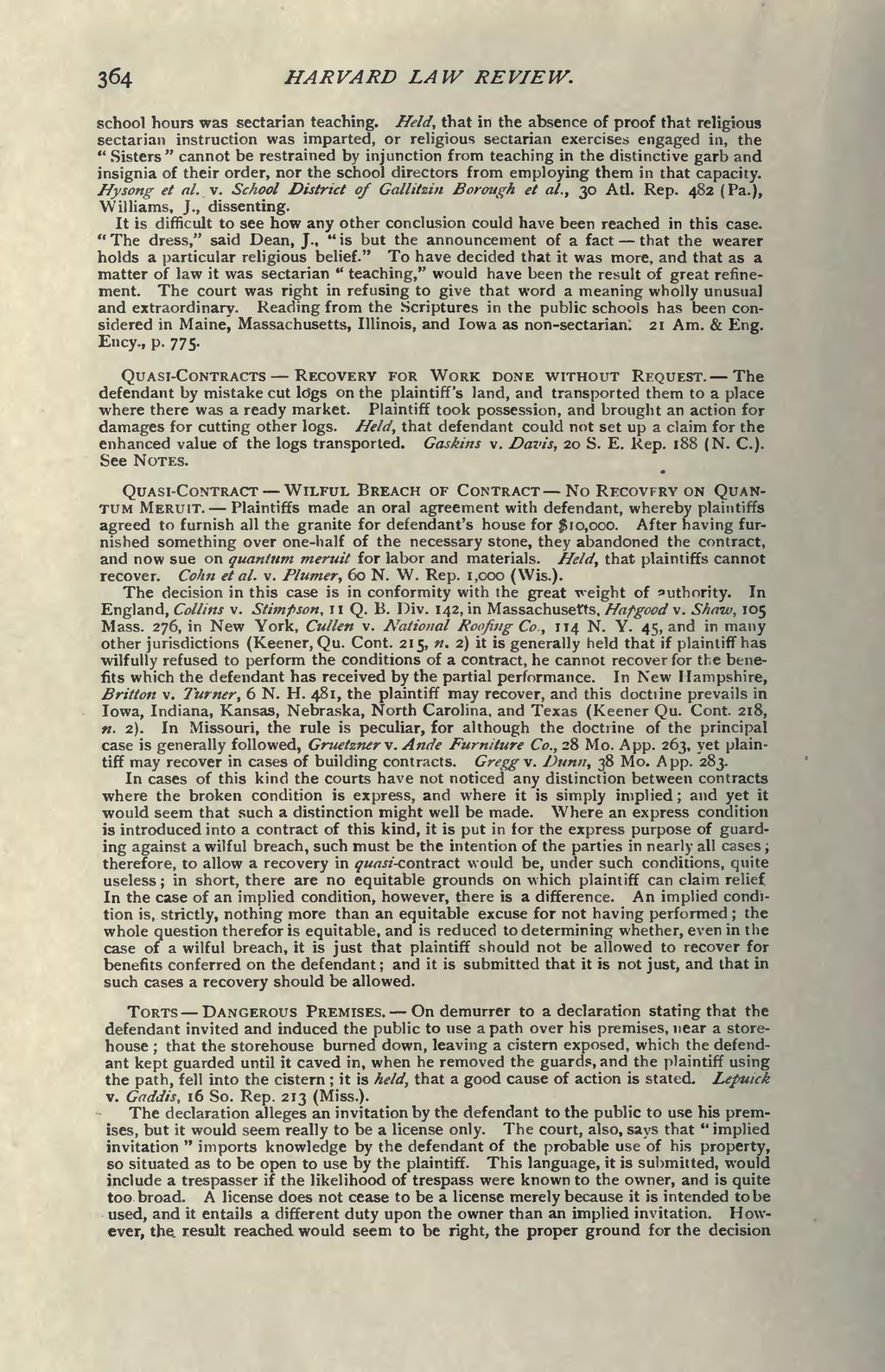3^4 HARVARD LAW REVIEW. school hours was sectarian teaching. Held, that in the absence of proof that religious sectarian instruction was imparted, or religious sectarian exercises engaged in, the " Sisters" cannot be restrained by injunction from teaching in the distinctive garb and insignia of their order, nor the school directors from employing them in that capacity. Hysong et al. . School District of Gallitzin Borough et al., 30 Atl. Rep. 482 (Pa.), Williams, J., dissenting. It is difficult to see how any other conclusion could have been reached in this case. " The dress," said Dean, J., " is but the announcement of a fact — that the wearer holds a i^articular religious belief." To have decided that it was more, and that as a matter of law it was sectarian " teaching," would have been the result of great refine- ment. The court was right in refusing to give that word a meaning wholly unusual and extraordinary. Reading from the Scriptures in the public schools has been con- sidered in Maine, Massachusetts, Illinois, and Iowa as non-sectarian. 21 Am. & Eng. Ency., p. 775. QUASI-CONTRACTS — RECOVERY FOR WORK DONE WITHOUT REQUEST. — The defendant by mistake cut Idgs on the plaintiff's land, and transported them to a place where there was a ready market. Plaintiff took possession, and brought an action for damages for cutting other logs. Held, that defendant could not set up a claim for the enhanced value of the logs transported. Gaskiiis v. Davis, 20 S. E. Rep. 188 (N. C). See Notes. QUASI-CONTRACT — WlLFUL BREACH OF CONTRACT — No ReCOVFRY ON QUAN- TUM Meruit. — Plaintiffs made an oral agreement with defendant, whereby plaintiffs agreed to furnish all the granite for defendant's house for J5io,ooo. After having fur- nished something over one-half of the necessary stone, they abandoned the contract, and now sue on quaniiufi mertiit for labor and materials. Held, that plaintiffs cannot recover. Cohn et al. v. Plumer, 60 N. W. Rep. 1,000 (Wis.). The decision in this case is in conformity with the great weight of 5>uthority. In England, Collins v. Stimpson, 11 Q. B. Div. 142, in Massachusetts, Hapgood v . Shaw, 105 Mass. 276, in New York, Cullen v. National Roofing Co., 114 N. Y. 45, and in many other jurisdictions (Keener, Qu. Cont. 215, n. 2) it is generally held that if plaintiff has wilfully refused to perform the conditions of a contract, he cannot recover for the bene- fits which the defendant has received by the partial performance. In New Hampshire, Britton v. Turner, 6 N. H. 481, the plaintiff may recover, and this doctiine prevails in Iowa, Indiana, Kansas, Nebraska, North Carolina, and Texas (Keener Qu. Cont. 218, n. 2). In Missouri, the rule is peculiar, for although the doctrine of the principal case is generally followed, Gruetznerv. Ande Furniture Co., 28 Mo. App. 263, yet plain- tiff may recover in cases of building contracts. Gregg v. Dunn, 38 Mo. App. 283. In cases of this kind the courts have not noticed any distinction between contracts where the broken condition is express, and where it is simply implied ; and yet it would seem that such a distinction might well be made. Where an express condition is introduced into a contract of this kind, it is put in for the express purpose of guard- ing against a wilful breach, such must be the intention of the parties in nearly all cases ; therefore, to allow a recovery in ^?/(7«'-contract would be, under such conditions, quite useless ; in short, there are no equitable grounds on which plaintiff can claim relief In the case of an implied condition, however, there is a difference. An implied condi- tion is, strictly, nothing more than an equitable excuse for not having performed; the whole question therefor is equitable, and is reduced to determining whether, even in the case of a wilful breach, it is just that plaintiff should not be allowed to recover for benefits conferred on the defendant ; and it is submitted that it is not just, and that in such cases a recovery should be allowed. Torts — Dangerous Premises. — On demurrer to a declaration stating that the defendant invited and induced the public to use a path over his premises, near a store- house ; that the storehouse burned down, leaving a cistern exposed, which the defend- ant kept guarded until it caved in, when he removed the guards, and the plaintiff using the path, fell into the cistern ; it is held, that a good cause of action is stated. Lepuick V. Gaddis, 16 So. Rep. 213 (Miss.). The declaration alleges an invitation by the defendant to the public to use his prem- ises, but it would seem really to be a license only. The court, also, says that " implied invitation " imports knowledge by the defendant of the probable use of his property, so situated as to be open to use by the plaintiff. This language, it is sulimitted, would include a trespasser if the likelihood of trespass were known to the owner, and is quite too broad. A license does not cease to be a license merely because it is intended to be used, and it entails a different duty upon the owner than an implied invitation. How- ever, the result reached would seem to be right, the proper ground for the decision
